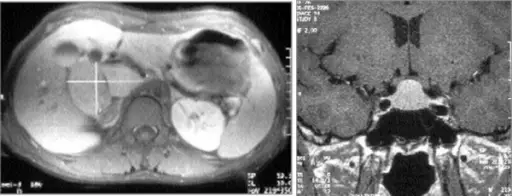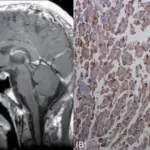Acromegaly is a chronic metabolic disorder in which there is much growth hormone and the body tissue gradually enlarges.
What is the Pathology of Acromegaly?
The pathology of Acromegaly is:
-Etiology: The cause of acromegaly is the pituitary gland adenoma, excessive growth hormone.
-Genes involved: GPR101, Familial isolated pituitary adenoma (FIPA), PRKAR1A, GNAS, MEN1, CDKN1B, McCune-Albright syndrome (MAS).
-Pathogenesis: The sequence of events that lead to acromegaly is the result of primary GH surplus, augmented GHRH production, and undue secretion of IGF-binding protein. Elevated tissue levels of free IGF-I, arbitrate most, of growth-related consequences in gigantism and acromegaly.
-Morphology: The morphology associated with acromegaly shows increased stature.
-Histology: The histology associated with acromegaly shows somatotrope carcinoma, Mixed somatotrope-lactotrope adenoma, infiltration of glycosaminoglycans, edematous and myxoid, slightly increased number of fibroblasts, and thinning of the epidermis.
How does Acromegaly Present?
Patients with acromegaly typically affect males and females in equal prevalence present at an age range of 15 to 45 years. The symptoms, features, and clinical findings associated with acromegaly include endocrinopathies, visual changes tall stature, headaches, macrocephaly, coarse facial structures, hyperhidrosis, osteoarthritis, cardiovascular disease, and tumors.
How is Acromegaly Diagnosed?
Acromegaly is diagnosed through laboratory studies to detect excess growth hormones, oral glucose test, IGF elevated. Imaging; MRI for pituitary adenomas, CT scan evaluate the adrenal, pancreatic, ovarian tumors producing GH/GHRH
How is Acromegaly Treated?
Acromegaly is treated through medical care; dopamine and somatostatin analog, radiation therapy. Transsphenoidal surgery for adenoma removal may be useful.
What is the Prognosis of Acromegaly?
The prognosis of acromegaly is poor. Severe ailment, often lately diagnosed, its mortality, morbidity rates are high.



